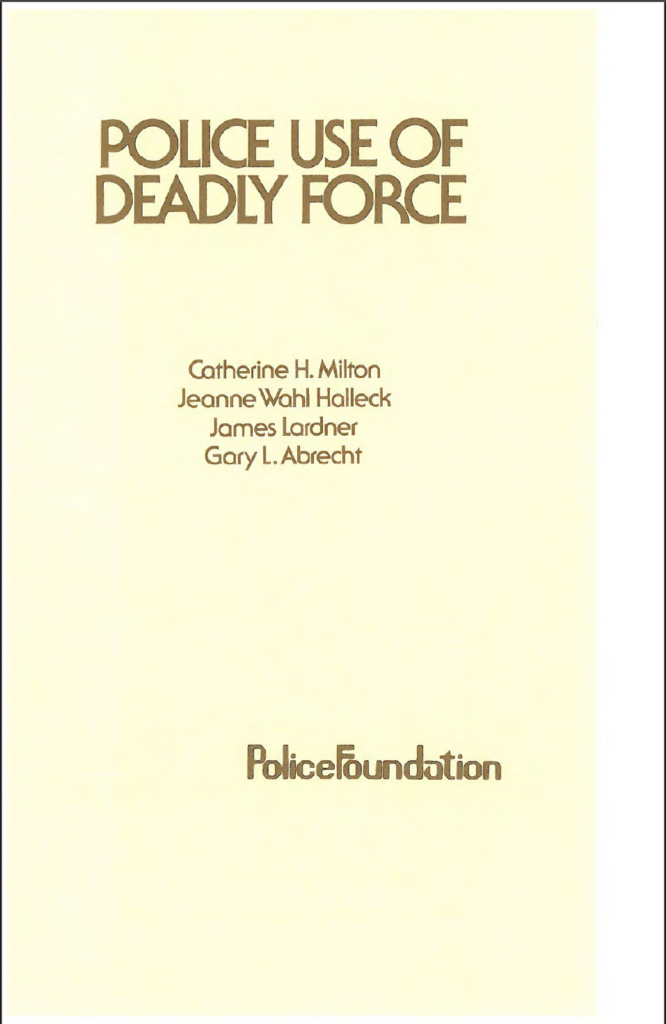Search results for: use of force
Police Use of Deadly Force
I am a: Law Enforcement Professional
Home › You searched for use of force › Page 2 I am a: Law Enforcement Professional The National Policing Institute’s mission is to encourage excellence in policing through science and innovation. But what does that mean? Law enforcement is one of our country’s most important professions and a critical part of our democracy. Every…
Read MoreNational Law Enforcement Roadway Safety Program Executive Session – Montgomery, Alabama
Officer-involved collisions and struck-by incidents continue to be leading causes of officer injuries and fatalities. This executive workshop provides an overview of available research about the risk factors for officer-involved collisions and struck-by incidents, and it identifies a variety of interventions and technological innovations agencies can utilize to improve officer safety during roadway operations. This…
Read MoreNational Law Enforcement Roadway Safety Program Executive Session – Freehold, New Jersey
Officer-involved collisions and struck-by incidents continue to be leading causes of officer injuries and fatalities. This executive workshop provides an overview of available research about the risk factors for officer-involved collisions and struck-by incidents, and it identifies a variety of interventions and technological innovations agencies can utilize to improve officer safety during roadway operations. This…
Read MoreNational Policing Institute Honors Legendary Law Enforcement Leaders Charles H. Ramsey, Lee P. Brown
The National Policing Institute (NPI) is honored to recognize two leaders for their significant and positive impacts on the law enforcement profession overall, and the agencies and communities they have each so admirably served. NPI’s National Awards Program comprises two prestigious recognitions: the Commissioner Patrick V. Murphy Award for Leading Change in Policing and, for…
Read More988 Lifeline is a Key Resource for Law Enforcement
In 1983, Dr. Arlie Russell Hochschild coined the term emotional labor after she examined two occupations, flight attendants and bill collectors, whose job descriptions centered largely on engaging with the public (1). At the end of her study, Dr. Hochschild concluded that these occupations require an individual to manage their feelings and emotions that occur…
Read MoreNational Law Enforcement Roadway Safety Program
A Serious Risk to Officer Safety According to data collected by the National Law Enforcement Officers Memorial Fund, 773 law enforcement officers were killed on the nation’s roadways from 2009-2023 (15 years). This includes 562 officers killed in motor vehicle collisions and 211 officers killed in struck-by incidents. About Register for Training Request TTA Resource…
Read MoreNPI Releases Report on the Reach and Influence of the 21st Century Policing Task Force Report
The National Policing Institute (NPI) is proud to partner with the Joyce Foundation and 21CP to assess the reach, impact, challenges, and successes of the principles of the 21st Century Policing Task Force Report (21CPTFR). This project examines the law enforcement field in the five years following the 21CPTFR’s finalization and publication, including both the…
Read MoreAs Part of Task Force, NPI’s Chief Behavioral Scientist Provides Recommendations on Policing to the Government Accountability Office
In Fall 2020, the National Policing Institute’s (NPI’s) Chief Behavioral Scientist, Dr. Karen L. Amendola, was appointed to the American Psychological Association’s (APA’s) Presidential Task Force on Use of Force Against African Americans. Earlier this year, on June 17, 2021, members of that APA Task Force, including Dr. Amendola, met with the Government Accountability Office…
Read MoreBuilding a Diverse Workforce in Law Enforcement
A worker shortage is sweeping the nation, and law enforcement is no exception. Across the country, law enforcement agencies struggle to recruit, hire, and retain police officers for reasons that span social, economic, and political factors.1 Compounding the problem, in some departments, officers are retiring at a faster rate than they are being replaced. The…
Read More






